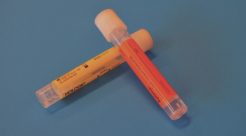
Most people will experience feelings of anxiety at some point in their lives. Usually, the feeling comes and goes and is a reaction that can help you be alert and motivated in certain situations. Some people may experience sexual anxiety that makes intimacy and looking after their sexual health difficult.
If you’re feeling anxious or nervous about your sexual health or having sex in general, you’re not alone and there are things that you can do to navigate anxiety to help create a safe and supportive environment for yourself and your partner/s.
What does sexual anxiety look like?
Sexual anxiety isn’t just for people of one sex, gender or age group. It can present itself from an early age, be the result of events that occurred in the past, or come as a response to pressures in everyday life. It can appear to come out of nowhere, before any sexual activity has begun or it can happen during or after sex.
People can feel anxiety around:
- having sex for the first time
- the STI testing status of your partner or yourself/STI stigma
- everyday stress or general life events
- fear of not satisfying your partner
- lack of self-confidence or poor body-image
- relationship concerns
- concerns about not being able to reach or enjoy an orgasm
- an underlying cause that you are not aware of yet.
Getting the right help can sometimes depend on the cause or trigger of the sexual anxiety. A great place to start is to have a chat with a supportive GP, call our free Sexual Healthline or make an appointment with our sexual health counsellors.
Sexual anxiety can also show up differently depending on the person.
Some people may:
- feel panicked, unsettled and uneasy at the thought of having sex
- be distracted and worried while having sex
- have ‘butterflies,’ or feeling uneasy in the stomach
- avoid and make excuses to not engage in sexual activity when this is something you want to enjoy
- avoid certain places or activities (like a sexual health clinic).
If you feel like you’re experiencing the above and it’s stopping you from enjoying sexual activity or looking after yourself, then it’s a good idea to talk about it with a sexual health professional or GP to discuss support.
It can be hard to take the first step, that is, to talk to someone about sexual anxiety. Ultimately those who work in sexual health have heard it all before and are trained to be non-judgmental and supportive.
Some of the health professionals that can support you in discussing and working through sexual anxiety include sexual health counsellors, sexual health physicians and sexologists.
Communicating how you feel
When sexual anxiety starts to take over it can make it hard for us to communicate our needs and expectations clearly to partner/s. Without this communication we make our lives harder for ourselves and our partner/s by not giving us the chance to find out what is best for all involved.
Communication is key. It’s a good idea to start by talking with your partner/s about what makes you feel comfortable, what you enjoy and what is making you feel uncomfortable or burdened.
Offer ideas for how your partner/s can support you and talk about what makes you both feel good – these starting points are also key to experiencing pleasure in any intimacy you have.
It’s likely that your partner/s want to know how you’re feeling and what they can do to make the experience mutually enjoyable and comfortable. Communicating what you want from sex and intimacy is so important in improving the experience of intimacy for you and your partner/s.
Worried about STIs?
Some people feel specific anxiety about STI testing – from the test itself to providing partner/s with results. When you’re experiencing anxiety around the results of getting a test or needing to communicate this to your sexual partner/s it’s easy to fall into a habit of avoidance. Making sure you book in a test regularly with a health professional (that you feel comfortable with) is key. When it comes to results, an experienced sexual health professional can give you tips on the best way to deliver this information. If you have any questions about testing or results, you can call SHINE SA’s free Sexual Healthline for advice.
SHINE SA’s health professionals are inclusive of all genders and sexual orientations and are non-judgmental experts in sexual health. Our sexual health checks/STI tests are free if you’re under 21 at SHINE SA.
To learn more about the process of getting an STI test, read: Ask SHINE SA: What’s Involved In Getting an STI Test?
Want to know more?
SHINE SA has a sexual health counselling service provided by experienced sexual health counsellors. Sexual health counsellors at SHINE SA provide a non-judgmental, supportive and confidential service for you to talk about the sexual health related concerns. Learn more about our sexual health counsellors: Sexual Health Counselling Services.
SHINE SA offers a free Sexual Healthline service, speak to a sexual health nurse between 9:00 am – 12:30 pm, Monday – Friday. Call 1300 883 793 or 1800 188 171 (toll-free) for country callers.










